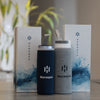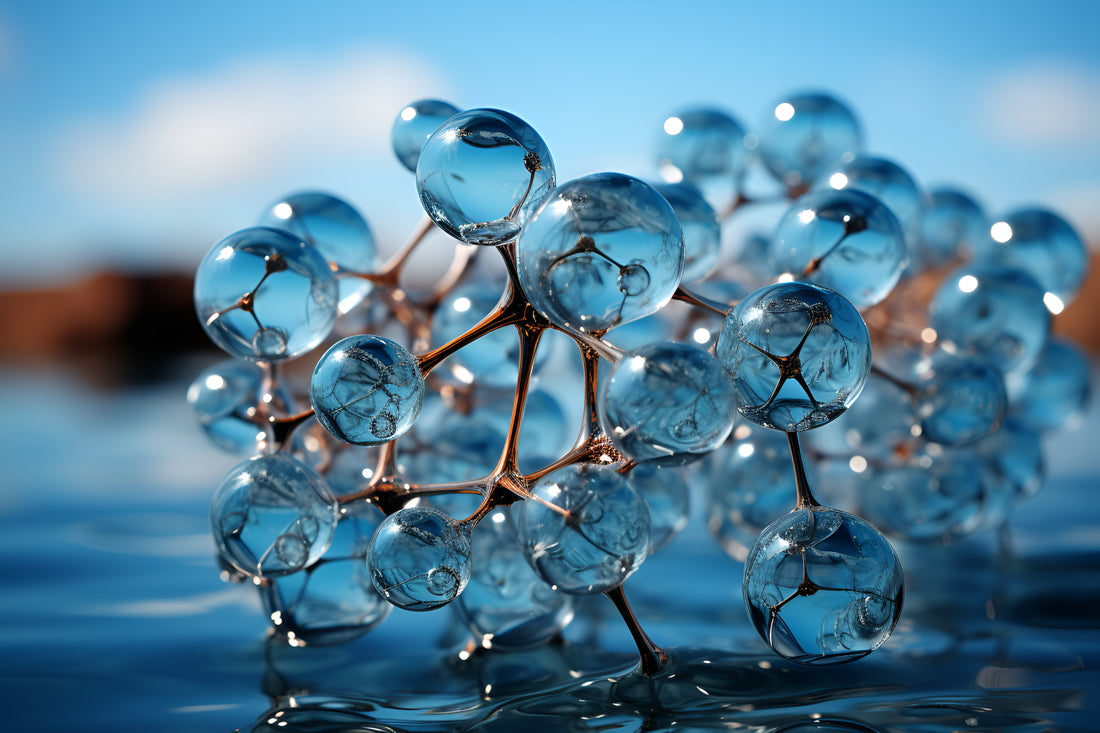Hydrogen Water Bottles Are Gaining Popularity
Hydrogen water bottles have become a trending topic in health and wellness discussions. They’re often described as an innovative way to enhance daily hydration by infusing ordinary water with molecular hydrogen.
Behind the marketing claims, however, lies a core scientific concept that has attracted the attention of researchers and consumers alike.
The goal of this article is to highlight how hydrogen water bottles work, why they’re considered potentially beneficial, and what you should know before investing in one.
By understanding both the promise and the skepticism, you can decide whether these devices align with your personal health goals.
Understanding Hydrogen Water: The Basics
Hydrogen water is regular H₂O that has been enriched with additional hydrogen gas (H₂). While standard water already includes hydrogen atoms chemically bound to oxygen, hydrogen water contains free hydrogen molecules that may offer antioxidant properties.
Several small-scale studies have examined hydrogen’s role in offsetting oxidative stress, which is linked to cellular damage and chronic conditions.
A paper published in Free Radical Research [1] found that molecular hydrogen could target harmful free radicals, although further research is needed to confirm the full extent of its effects in humans.
The appeal of hydrogen water partly stems from how accessible it is.
Instead of relying on specialized clinics or expensive treatments, users can generate hydrogen-rich water at home with a compact device.
Despite the convenience, it’s essential to remember that these claims about antioxidant benefits remain preliminary and that the FDA does not regulate hydrogen water as a treatment for any disease.
The Rising Trend of Hydrogen Water Bottles
Many people first hear about hydrogen water bottles through social media or word of mouth, where early adopters and health enthusiasts share anecdotal reports of feeling more energized and recovering faster from workouts.
Athletes, in particular, are intrigued by the possibility that hydrogen’s antioxidant potential might help reduce muscle soreness or inflammation.
At the same time, everyday consumers are drawn to the simple premise: press a button, wait a minute or two, and drink water that might offer additional support against oxidative stress.
Brands are capitalizing on this interest by developing portable bottles equipped with miniature electrolysis chambers.
The idea is that you can produce hydrogen-rich water wherever you are—at work, at the gym, or even on vacation.
While some critics see this as a marketing ploy, enough scientific groundwork exists to make the topic intriguing rather than outright dismissible.
How Hydrogen Water Bottles Work
A hydrogen water bottle typically uses electrolysis to split water molecules (H₂O) into hydrogen (H₂) and oxygen (O₂).
The hydrogen gas then dissolves back into the water, creating what we call hydrogen water.
The technology may differ from one model to another, but most aim to achieve the same goal: deliver a higher concentration of molecular hydrogen.
Here’s what happens behind the scenes:
- You fill the bottle with clean, filtered water.
- The electrolysis process begins upon activation, usually by pressing a button.
- Water molecules separate into hydrogen and oxygen.
- Hydrogen gas dissolves, while oxygen is vented out (often through a small valve).
- You end up with water enriched in molecular hydrogen for immediate consumption.
This method is frequently supported by a Proton Exchange Membrane (PEM), which helps ensure that only pure hydrogen is infused, reducing the risk of generating chlorine or other unwanted byproducts.
Some bottles also incorporate Solid Polymer Electrolyte (SPE) systems, a design that further refines the gas separation process.

The Heraqua Hydrogen Water Bottles
The Claimed Benefits of Drinking Hydrogen Water
Supporters of hydrogen water point to a range of potential advantages, most of which revolve around the antioxidant and anti-inflammatory effects of molecular hydrogen.
Some researchers have explored how hydrogen might neutralize hydroxyl radicals, one of the most damaging types of free radicals, and thus mitigate oxidative stress.
Advocates often mention:
- Reduced Inflammation: Hydrogen may help lower inflammation markers, theoretically improving comfort in joints or muscles.
- Enhanced Athletic Performance: By combating oxidative stress during exercise, hydrogen water could lead to better stamina and faster recovery.
- Improved Energy and Mental Clarity: Some believe that hydrogen’s capacity to enter cells quickly might support mitochondrial function, yielding better daily energy.
Nonetheless, comprehensive studies remain limited.
While small trials show promise—for instance, research in Medical Gas Research [2] indicated hydrogen water could reduce inflammation in certain contexts—robust, large-scale human trials are still needed.
Is Hydrogen Water Backed by Science?
Molecular hydrogen’s potential has attracted genuine scientific interest.
A few in vitro and animal model studies point to a noticeable antioxidant action, and anecdotal experiences from users and athletes continue to fuel curiosity.
Skeptics, however, emphasize that many experiments are preliminary, involving small sample sizes.
Researchers continue to investigate:
- Hydrogen water’s effect on chronic inflammation.
- Its possible role in metabolic health (blood sugar, cholesterol).
- Neuroprotective or cognitive benefits linked to antioxidant activity.
Critics rightly note that better-defined, randomized clinical trials are essential to fully validate hydrogen water as a health aid.
People who incorporate hydrogen water into their routine should understand that it’s not a replacement for medical advice, but rather a supplemental approach that might fit into a broader wellness lifestyle.

Potential Negative Side Effects and Safety Concerns
Most hydrogen water bottles are considered safe when engineered to proper standards, yet users should remain cautious.
Hydrogen water production can potentially introduce contaminants if the device is poorly constructed or uses substandard membranes.
Checking brand reputation, user reviews, and any third-party lab testing is often wise.
So far, no major adverse effects have been widely documented, but it’s prudent to approach unregulated products with an informed eye.
Hydrogen Water Bottle Reviews: What Users Are Saying
Online reviews paint a varied picture of hydrogen water bottles.
Many owners praise the convenience and note feeling more refreshed or energized, while others see no marked improvement compared to normal water.
The price points of quality bottles can be high, sparking debate about the cost-effectiveness if the benefits are subtle.
Some mention design flaws such as weak battery life or delicate components, which underscores the importance of brand research and warranty policies.
Common feedback often mentions:
- Slight improvements in daily energy or post-workout recovery.
- Mixed experiences with bottle durability and ease of cleaning.
- Questions about whether perceived benefits might be placebo-driven.
Ultimately, personal experiences differ, suggesting that factors like baseline health, diet, and workout intensity can influence outcomes.

Debunking Myths: Is Hydrogen Water a Gimmick or Legit?
Some suspect marketing hype when they see new wellness products—hydrogen water is no exception.
However, labeling it a gimmick overlooks genuine molecular science behind antioxidant mechanisms.
The core question is how effective it truly is in daily life.
A balanced perspective notes that hydrogen water is not FDA-approved for disease prevention or treatment.
Instead, it may serve as a complementary approach for those interested in functional beverages.
While certain marketing campaigns might overpromise, the basic principle—molecular hydrogen’s potential antioxidant effect—has enough preliminary backing to merit cautious optimism.
The Placebo Effect and Consumer Expectations
Expectations strongly shape user experiences.
If someone invests in a hydrogen water bottle believing it will boost stamina, they might feel improvements that derive partly from placebo.
This isn’t necessarily detrimental if it encourages them to maintain better hydration habits or adopt healthier routines in general.
Yet it’s important to remain grounded, acknowledging that hydrogen water alone is unlikely to be a miracle solution.
Regulatory Oversight and Industry Standards
Because hydrogen water bottles fall under the wellness product category, the industry does not face uniform regulatory oversight like pharmaceuticals do.
As a result, product quality and marketing claims vary widely.
To protect themselves, consumers should look for:
- Transparent manufacturing details.
- Reputable brands that provide testing data.
- Clear disclaimers distinguishing between anecdotal observations and proven scientific facts.
Staying informed about any recognized labels or certifications can further safeguard buyers from misleading claims.
How to Choose the Right Hydrogen Water Bottle
A well-chosen device can make hydrogen-rich water both safe and convenient. Several factors might guide your purchase:
- Technology & Materials: Proton Exchange Membrane (PEM) and Solid Polymer Electrolyte (SPE) designs can ensure cleaner hydrogen generation. Food-grade or BPA-free materials help maintain water purity.
- Concentration and Customization: Some bottles let you select hydrogen concentration levels, which may be handy for tailoring your intake.
- Battery Life & Maintenance: Look for user-friendly bottles that are easy to clean and provide decent battery longevity, especially if you plan to use them multiple times a day.
Price varies significantly, so weigh any advanced features against your actual needs.
It’s often beneficial to check user testimonials and review articles before finalizing a purchase.
Reliable customer support and warranties can also enhance your peace of mind.
Daily Usage: How to Get the Most Out of Your Bottle
Though usage varies by model, most hydrogen water bottles follow a basic routine: fill with clean water, start the electrolysis cycle, wait a minute or two, and then drink soon afterward.
Hydrogen gas can dissipate if the water sits for too long, so it’s best to consume promptly.
Consider integrating hydrogen water strategically.
Some users enjoy it first thing in the morning for a potential energy lift, while others rely on it pre-workout to maintain hydration and post-workout to aid muscle recovery.
Tracking changes in energy, workout performance, or general well-being helps you decide whether it’s having a tangible impact.
If improvements are noted, keep consistent usage a priority.
Here are a few tips to keep in mind:
- Store or charge the bottle according to manufacturer guidelines.
- Clean the electrode and membrane components periodically to avoid residue.
- Use filtered water to prevent mineral buildup or unpleasant tastes in the final product.
The Future of Hydrogen Water: Trends and Research
Ongoing research aims to clarify hydrogen water’s impact in areas like chronic inflammation, metabolic health, and cognitive function.
While skeptics call for larger randomized studies, more labs are initiating trials to validate (or refute) the early findings.
The consumer market continues to expand globally, with new devices featuring advanced features such as continuous hydrogen generation modes or integrated smartphone apps.
Potential next steps in science and industry include exploring hydrogen water’s synergy with other functional wellness products and seeking stronger empirical evidence to define usage guidelines.
Conclusion: Making an Informed Decision
Hydrogen water bottles provide a novel approach to boosting everyday hydration.
By infusing water with molecular hydrogen, they offer a potential edge against oxidative stress, inflammation, and exercise-related fatigue.
Yet it’s essential to remain critical of exaggerated claims. The research so far highlights possibilities rather than certainties, and personal anecdotes vary widely.
Adopting a hydrogen water routine should complement, not replace, established healthy habits like balanced nutrition, regular exercise, and quality sleep.
If you’re intrigued by the science, it may be worth experimenting—particularly if you choose a reliable, well-reviewed bottle and monitor your results over time.
By staying informed and balancing enthusiasm with evidence, you can decide whether hydrogen water is a beneficial addition to your life.
Disclaimer
This article is intended for informational purposes only and does not constitute medical advice or recommendations for specific treatments.
Always consult a qualified healthcare professional if you have concerns about your health or plan to make significant lifestyle changes.
Research on hydrogen water is ongoing, and individual outcomes may differ.
Articles
Effects of the long-term consumption of hydrogen-rich water on the antioxidant activity
Hydrogen Water: Extra Healthy or a Hoax?
References
[1] Nagatani K, et al. Free Radical Research, 2007.
[2] Ohsawa I, et al. Medical Gas Research, 2010.




